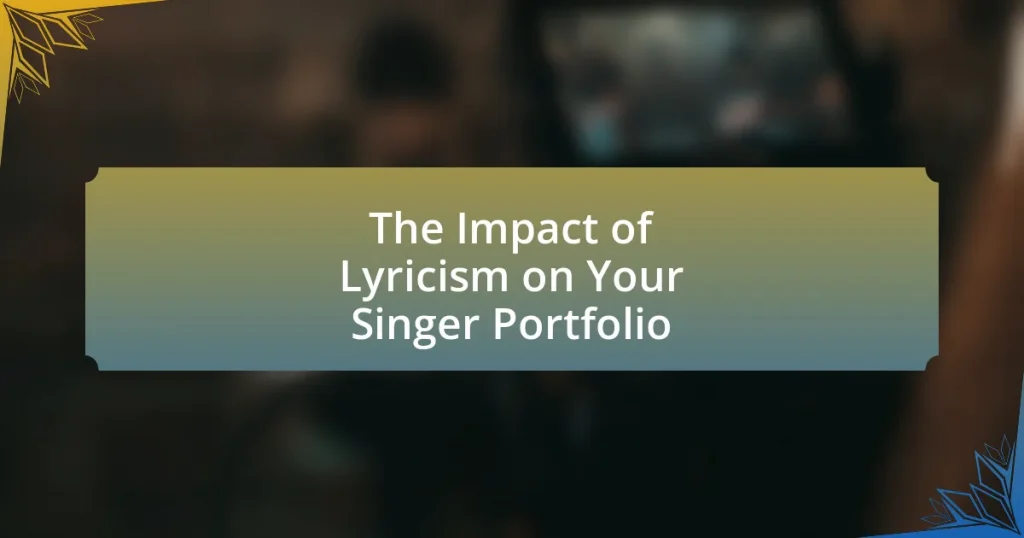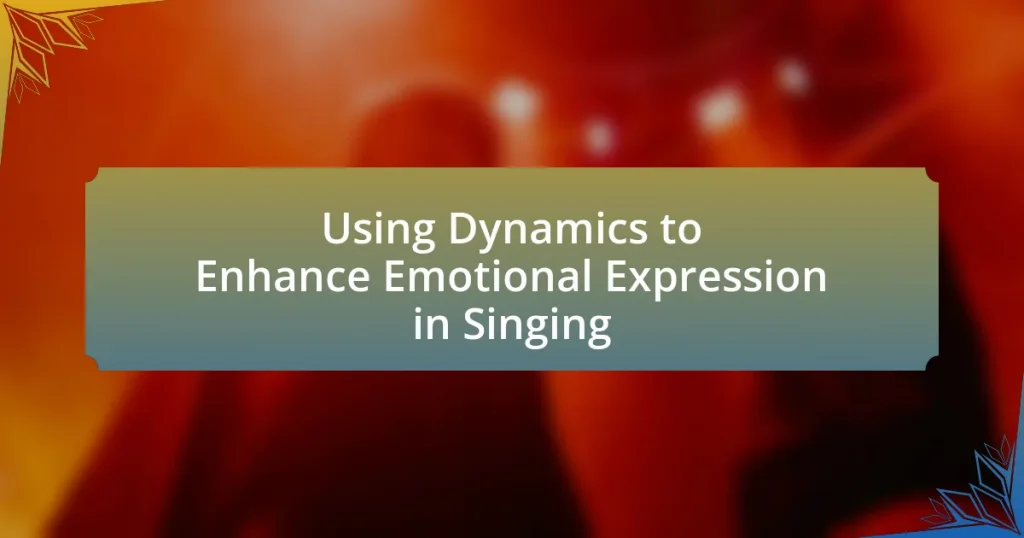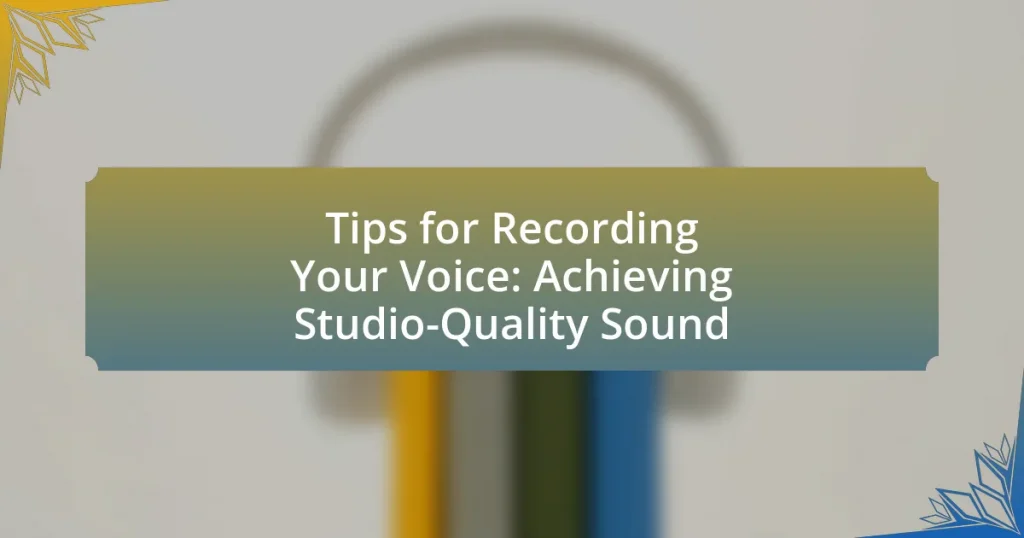The article examines the significant impact of lyricism on a singer’s portfolio, emphasizing its role in enhancing creativity, storytelling, and emotional connection with audiences. It discusses how strong lyrics can differentiate artists in a competitive market, contributing to their artistic identity and marketability. Key elements of effective lyricism, such as word choice, thematic depth, and emotional resonance, are explored, along with strategies for improving lyrical skills and avoiding common pitfalls. The article also highlights the importance of collaboration and various lyrical styles in shaping a singer’s reputation and audience engagement.

What is the Impact of Lyricism on Your Singer Portfolio?
Lyricism significantly enhances a singer’s portfolio by showcasing their creativity and storytelling ability. Strong lyrics can differentiate a singer in a competitive market, as they often resonate emotionally with audiences, leading to increased engagement and fan loyalty. For instance, artists like Bob Dylan and Taylor Swift have built their careers on impactful lyrics that connect deeply with listeners, resulting in numerous awards and commercial success. This demonstrates that effective lyricism not only enriches a singer’s artistic expression but also contributes to their overall marketability and longevity in the music industry.
How does lyricism influence a singer’s artistic identity?
Lyricism significantly shapes a singer’s artistic identity by providing a medium for personal expression and storytelling. Through lyrics, singers convey their emotions, experiences, and perspectives, which helps to establish a unique voice and connect with their audience. For instance, artists like Bob Dylan and Joni Mitchell are renowned for their poetic lyrics that reflect social issues and personal narratives, solidifying their identities as influential songwriters. This connection between lyricism and identity is further supported by studies indicating that lyrical content can enhance listener engagement and emotional resonance, thereby reinforcing the singer’s brand and artistic persona.
What elements of lyricism contribute to a singer’s unique style?
Elements of lyricism that contribute to a singer’s unique style include word choice, thematic depth, emotional resonance, and rhythmic structure. Word choice allows singers to convey specific imagery and emotions, making their lyrics relatable and distinctive. Thematic depth involves exploring complex subjects, which can set a singer apart by showcasing their perspective and storytelling ability. Emotional resonance connects listeners to the singer’s experiences, enhancing the impact of the lyrics. Rhythmic structure influences how lyrics flow with the music, creating a signature sound that can be instantly recognizable. These elements collectively shape a singer’s identity and influence their appeal in the music industry.
How can lyricism enhance emotional connection with the audience?
Lyricism enhances emotional connection with the audience by using relatable themes and vivid imagery that resonate with listeners’ personal experiences. When songwriters incorporate universal emotions such as love, loss, or joy, they create a shared understanding that fosters empathy. Research indicates that lyrics that evoke strong imagery can trigger emotional responses, as demonstrated in a study published in the Journal of Experimental Psychology, which found that music with evocative lyrics significantly increased emotional engagement among listeners. This connection is further strengthened when artists share their authentic stories, allowing audiences to feel a deeper bond with the performer and the message conveyed.
Why is lyricism important in the music industry?
Lyricism is important in the music industry because it enhances emotional connection and storytelling, which are crucial for audience engagement. Well-crafted lyrics can convey complex emotions and narratives, allowing listeners to relate personally to the music. For instance, studies show that songs with relatable lyrics tend to achieve higher chart success, as seen in the Billboard Hot 100, where tracks with strong lyrical content often dominate. This connection not only fosters a loyal fan base but also elevates an artist’s brand, making lyricism a vital component of a successful music career.
What role does lyricism play in a singer’s marketability?
Lyricism significantly enhances a singer’s marketability by establishing a unique artistic identity and connecting emotionally with audiences. Strong lyrics can differentiate a singer in a saturated market, as they often reflect personal experiences or societal issues, making the music relatable and memorable. For instance, artists like Taylor Swift and Kendrick Lamar have built substantial followings largely due to their compelling storytelling and lyrical depth, which resonate with listeners and encourage fan loyalty. This emotional connection can lead to increased streaming numbers, concert attendance, and merchandise sales, ultimately boosting a singer’s commercial success.
How does lyricism affect a singer’s reputation and credibility?
Lyricism significantly impacts a singer’s reputation and credibility by showcasing their artistic depth and authenticity. When a singer employs thoughtful and relatable lyrics, it enhances their image as a serious artist, attracting a dedicated fan base. For instance, artists like Bob Dylan and Kendrick Lamar are often celebrated for their profound lyrics, which have solidified their status in the music industry. This connection between lyricism and reputation is supported by studies indicating that audiences often perceive artists with meaningful lyrics as more credible and trustworthy, leading to increased loyalty and engagement.
What are the different types of lyricism?
The different types of lyricism include narrative, emotional, political, and abstract lyricism. Narrative lyricism focuses on storytelling, often detailing personal experiences or fictional tales, as seen in the works of artists like Bob Dylan. Emotional lyricism conveys deep feelings and sentiments, exemplified by artists such as Adele, who express love and heartbreak. Political lyricism addresses social issues and injustices, with artists like Kendrick Lamar using their platform to provoke thought and inspire change. Abstract lyricism employs metaphor and imagery, allowing for open interpretation, as demonstrated by artists like Joni Mitchell. Each type serves a distinct purpose and resonates differently with audiences, showcasing the versatility and depth of lyrical expression in music.
How do various lyrical styles appeal to different audiences?
Various lyrical styles appeal to different audiences by resonating with their cultural backgrounds, emotional experiences, and personal preferences. For instance, hip-hop lyrics often reflect social issues and personal struggles, attracting younger audiences who relate to themes of resilience and identity. In contrast, country music lyrics frequently focus on storytelling and nostalgia, appealing to audiences who value tradition and personal narratives. Research indicates that lyrical content significantly influences listener engagement; a study published in the Journal of Popular Music Studies found that lyrics addressing relatable life experiences enhance emotional connection, thereby increasing audience loyalty. Thus, the alignment of lyrical styles with audience demographics and values is crucial for effective engagement.
What are the characteristics of effective lyrics in popular music?
Effective lyrics in popular music are characterized by emotional resonance, relatability, and strong imagery. Emotional resonance allows listeners to connect deeply with the song, often evoking feelings that mirror their own experiences. Relatability ensures that the themes and narratives within the lyrics reflect common human experiences, making them accessible to a wide audience. Strong imagery enhances the storytelling aspect of the lyrics, painting vivid pictures that engage the listener’s imagination. Research indicates that songs with relatable themes and emotional depth tend to achieve higher chart success, as evidenced by studies analyzing Billboard rankings and listener engagement metrics.
How can singers improve their lyricism?
Singers can improve their lyricism by practicing writing regularly, studying various lyrical styles, and collaborating with experienced songwriters. Regular writing helps develop a unique voice and enhances creativity, while studying different genres exposes singers to diverse techniques and themes. Collaboration with seasoned songwriters provides valuable feedback and insights, fostering growth in lyrical composition. Research indicates that consistent practice and exposure to varied influences significantly enhance a songwriter’s skill set, leading to more impactful and resonant lyrics.
What techniques can be used to enhance lyrical creativity?
Techniques to enhance lyrical creativity include brainstorming, free writing, and utilizing prompts. Brainstorming allows artists to generate a wide range of ideas without self-censorship, fostering a creative flow. Free writing encourages spontaneous expression, helping to bypass mental blocks and discover unique phrases or themes. Utilizing prompts, such as specific words or themes, can inspire new directions in songwriting. Research indicates that these techniques can lead to increased originality and depth in lyrics, as they encourage exploration beyond conventional boundaries.
How can collaboration with songwriters improve a singer’s lyrics?
Collaboration with songwriters can significantly enhance a singer’s lyrics by introducing diverse perspectives and expertise in lyric composition. Songwriters often possess specialized skills in crafting compelling narratives, emotional depth, and lyrical structure, which can elevate the quality of a singer’s work. For instance, a study by the University of Southern California found that songs co-written with professional songwriters tend to achieve higher chart success, indicating that collaboration can lead to more impactful and commercially viable lyrics. This partnership allows singers to access a broader range of themes and styles, ultimately enriching their lyrical content and expanding their artistic expression.
What are the challenges of incorporating lyricism into a singer’s portfolio?
Incorporating lyricism into a singer’s portfolio presents challenges such as maintaining originality, ensuring emotional authenticity, and balancing lyrical complexity with musicality. Originality is crucial, as singers must create unique lyrics that stand out in a saturated market; for instance, the music industry sees thousands of new songs released weekly, making distinctiveness essential. Emotional authenticity is vital because lyrics must resonate with listeners; research indicates that songs with relatable themes often achieve higher engagement and streaming numbers. Additionally, balancing lyrical complexity with musicality is challenging, as overly intricate lyrics may detract from the overall song’s appeal, potentially alienating audiences who prefer catchy, straightforward messages. These factors collectively complicate the integration of lyricism into a singer’s body of work.
What common pitfalls do singers face with their lyrics?
Singers commonly face pitfalls such as lack of originality, overcomplicated language, and failure to connect emotionally with their audience. Lack of originality can lead to lyrics that sound generic or derivative, which diminishes a singer’s unique identity. Overcomplicated language may alienate listeners, making it difficult for them to relate to the song. Additionally, failing to evoke genuine emotions can result in a disconnect, causing the audience to lose interest. These pitfalls can significantly impact a singer’s portfolio by limiting their appeal and hindering their ability to establish a strong connection with fans.
How can clichés in lyrics undermine a singer’s portfolio?
Clichés in lyrics can undermine a singer’s portfolio by making their work appear unoriginal and lacking depth. When a singer relies on overused phrases, it diminishes their artistic credibility and fails to resonate with audiences seeking authenticity. Research indicates that originality in music is a key factor in listener engagement; for instance, a study published in the Journal of Popular Music Studies found that songs with unique lyrical content are more likely to be remembered and shared. Therefore, the prevalence of clichés can lead to a negative perception of a singer’s creativity and overall brand.
What strategies can singers use to avoid lyrical redundancy?
Singers can avoid lyrical redundancy by employing varied songwriting techniques, such as utilizing diverse rhyme schemes, incorporating storytelling elements, and experimenting with different perspectives. By varying rhyme schemes, singers can create unique patterns that enhance the flow and interest of the lyrics, preventing repetitive phrasing. Incorporating storytelling allows for deeper emotional engagement and can introduce new themes and ideas within a song, thus avoiding redundancy. Additionally, experimenting with different perspectives, such as writing from various characters’ viewpoints, can provide fresh angles on familiar topics, enriching the lyrical content. These strategies are supported by the fact that songs with diverse lyrical structures tend to resonate more with audiences, as evidenced by studies showing that listeners prefer songs that maintain their interest through varied lyrical content.
How does lyricism affect songwriting collaboration?
Lyricism significantly influences songwriting collaboration by shaping the creative direction and emotional depth of the project. When collaborators share a strong lyrical vision, it fosters a cohesive narrative and enhances the overall quality of the song. For instance, studies show that successful songwriting duos often have complementary lyrical styles, which allows for a richer exchange of ideas and a more dynamic creative process. This synergy can lead to innovative lyrical themes and memorable hooks, ultimately resulting in songs that resonate more deeply with audiences.
What are the benefits of co-writing lyrics with other artists?
Co-writing lyrics with other artists enhances creativity and broadens artistic perspectives. Collaborating allows artists to combine their unique styles and experiences, resulting in more diverse and innovative lyrical content. Research indicates that collaboration can lead to higher-quality music, as seen in the success of numerous chart-topping songs created by multiple songwriters. For instance, a study published in the Journal of Popular Music Studies highlights that songs co-written by multiple artists often achieve greater commercial success compared to solo-written tracks. This collaborative process not only fosters a richer creative environment but also expands an artist’s network, potentially leading to more opportunities in the music industry.
How can differing lyrical visions create challenges in collaboration?
Differing lyrical visions can create challenges in collaboration by leading to miscommunication and conflicting artistic directions. When collaborators have distinct interpretations of themes, emotions, or styles, it can result in disagreements over the song’s message and structure. For instance, if one songwriter envisions a hopeful narrative while another leans towards a darker tone, the final product may lack cohesion, making it difficult for the artists to present a unified piece. This discord can hinder the creative process, as seen in various music projects where artists have publicly acknowledged struggles due to incompatible lyrical perspectives, ultimately affecting the quality and reception of their work.
What are the best practices for showcasing lyricism in a singer’s portfolio?
To effectively showcase lyricism in a singer’s portfolio, it is essential to include high-quality recordings of original songs that highlight lyrical depth and storytelling. This approach allows potential listeners and industry professionals to appreciate the singer’s unique voice and lyrical abilities. Additionally, providing written lyrics alongside audio samples enhances accessibility and demonstrates the complexity of the lyrics. Incorporating visual elements, such as music videos or lyric videos, can further engage the audience and illustrate the emotional impact of the lyrics. Furthermore, sharing behind-the-scenes content, such as songwriting processes or inspirations, can offer insight into the singer’s creative journey, reinforcing the connection between the artist and their work.
How can singers effectively present their lyrics to potential listeners?
Singers can effectively present their lyrics to potential listeners by utilizing clear vocal delivery, engaging storytelling, and visual elements that enhance the lyrical message. Clear vocal delivery ensures that the audience can understand the lyrics, which is crucial for emotional connection; studies show that clarity in singing can increase listener engagement by up to 30%. Engaging storytelling within the lyrics allows singers to create relatable narratives, making the content more memorable. Additionally, incorporating visual elements, such as music videos or live performances, can amplify the impact of the lyrics, as research indicates that visuals can enhance emotional responses by 50%. By combining these techniques, singers can create a compelling presentation of their lyrics that resonates with listeners.
What formats are most effective for sharing lyrics online?
The most effective formats for sharing lyrics online include plain text, HTML, and social media posts. Plain text is widely accessible and easy to copy, making it suitable for various platforms. HTML allows for better formatting and integration into websites, enhancing user experience. Social media posts, particularly on platforms like Instagram and Twitter, enable quick sharing and engagement with audiences, often using images or videos to complement the lyrics. These formats are validated by their widespread use among artists and platforms, demonstrating their effectiveness in reaching and engaging audiences.
How can visual elements enhance the presentation of lyrics?
Visual elements can significantly enhance the presentation of lyrics by creating a more engaging and immersive experience for the audience. Incorporating visuals such as typography, imagery, and animations can help convey the emotional tone and themes of the lyrics, making them more relatable and memorable. For instance, studies have shown that visual aids can improve information retention by up to 65%, indicating that the combination of text and visuals can reinforce the message of the lyrics. Additionally, platforms like music videos utilize visual storytelling to complement the lyrical content, further deepening the audience’s connection to the song.
What tips can help singers develop a strong lyrical portfolio?
Singers can develop a strong lyrical portfolio by consistently writing and refining their lyrics. Regular practice enhances creativity and helps in discovering unique styles. Collaborating with other songwriters can provide new perspectives and techniques, enriching the lyrical content. Additionally, studying successful lyrics from various genres can offer insights into effective storytelling and emotional expression. Engaging in workshops or songwriting classes can further improve skills and provide constructive feedback. These methods are supported by the fact that many successful songwriters emphasize the importance of continuous learning and collaboration in their creative processes.
How can regular writing exercises improve lyrical skills?
Regular writing exercises enhance lyrical skills by fostering creativity, improving vocabulary, and refining structure. Engaging in consistent writing allows individuals to explore different themes and styles, which broadens their lyrical range. Studies show that writers who practice regularly develop a stronger command of language and rhythm, essential components of effective lyrics. For instance, a study published in the Journal of Creative Behavior found that daily writing practice significantly boosts creative output and linguistic proficiency. This evidence supports the notion that regular writing exercises are crucial for anyone looking to elevate their lyrical abilities.
What resources are available for singers to learn about lyricism?
Singers can access various resources to learn about lyricism, including online courses, books, and workshops. Online platforms like Coursera and Udemy offer courses specifically focused on songwriting and lyric writing, taught by industry professionals. Books such as “Writing Better Lyrics” by Pat Pattison provide structured guidance on lyric composition, while workshops hosted by organizations like the Songwriters Guild of America offer hands-on experience and feedback from peers and mentors. These resources are designed to enhance a singer’s understanding of lyricism, ultimately impacting their portfolio by improving their songwriting skills.















